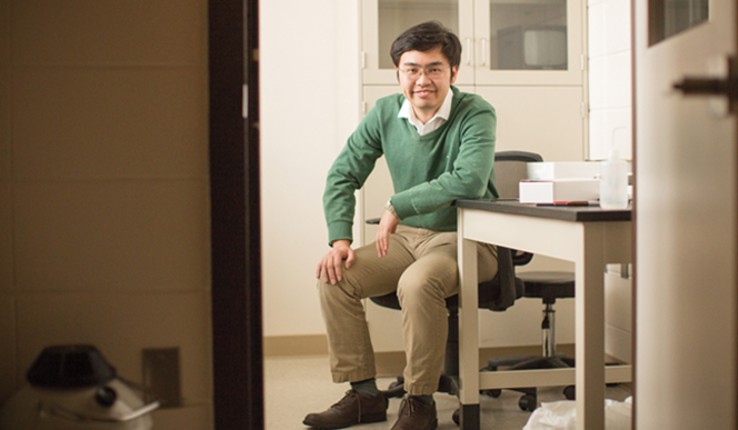Lehigh chemistry professor, Xiaoji Xu, has been selected as a Camille Dreyfus Teacher-Scholar for 2021. Xu is one of only 16 individuals chosen this year to receive this highly-competitive award from the Camille and Henry Dreyfus Foundation. The award is granted to faculty who are within the first five years of their academic careers who have “created an outstanding independent body of scholarship, and are deeply committed to education.” Each Camille Dreyfus Teacher-Scholar receives $100,000 in unrestricted research funds.
“Thank you to the Camille and Henry Dreyfus Foundation for this firm acknowledgement of my research creativity and commitment to teaching," says Xu, associate professor of chemistry. "Being a Dreyfus Teacher-Scholar and working at Lehigh for me means striving for the best in both research and teaching."
The Xu Research Group develops new methods and instruments for chemical measurement and imaging at the nanoscale with < 10 nm spatial resolution. They employ two infrared nanoscale imaging methods invented by Xu: peak force scattering-type near-field optical microscopy (PF-SNOM) and peak force infrared (PFIR) microscopy. These techniques empower researchers to study previously inaccessible nanoscale objects with multimodal spectroscopic information close to the lower limit of spatial scale. His group also recently invented the pulsed force Kelvin probe force microscopy, a new type of imaging tool that allows for ~ 10 nm spatial resolution for measurement of surface potential under the ambient conditions.
In order to enhance the experience of his students during this past year of remote teaching, Xu developed a simulation based on his research which, says Alan Snyder, vice president and associate provost for research and graduate studies, is “an example of the kind of educational experience that we can provide when we have active investigators who are so accomplished, committed, and creative.”
“We are thrilled with Professor Xu’s receipt of the Camille Dreyfus Award, an important recognition of his work at Lehigh,“ said Robert Flowers, Herbert J. and Ann L. Siegel Dean of the College of Arts and Sciences and the Danser Distinguished Faculty Chair of the Department of Chemistry. “He is an exemplar of the scholar-teacher model we embrace in the College of Arts and Sciences.”
In 2020, Xu was named a Sloan Research Fellow. This prestigious award, funded by the Alfred P. Sloan Foundation, places Xu among “the most promising scientific researchers working today.” In 2019, he received the CAREER award from the National Science Foundation. In 2018, Xu was named a Beckman Young Investigator, earning a prestigious grant awarded by the Arnold and Mabel Beckman Foundation for “the most promising young faculty members in the early stages of their academic careers in the chemical and life sciences.”
According to the Foundation’s website, the purpose of the Camille and Henry Dreyfus Foundation, Inc., is to advance the science of chemistry, chemical engineering, and related sciences as a means of improving human relations and circumstances throughout the world. Established in 1946 by chemist, inventor, and businessman Camille Dreyfus as a memorial to his brother Henry, the Foundation became a memorial to both men when Camille Dreyfus passed away in 1956.





